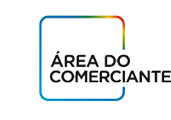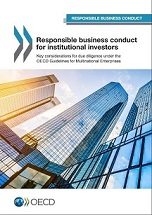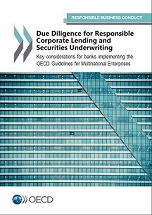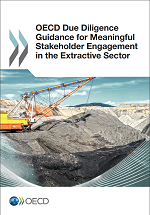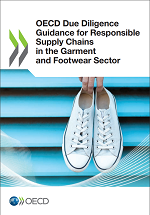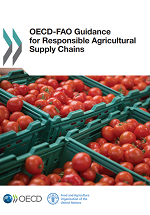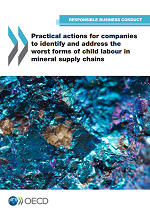
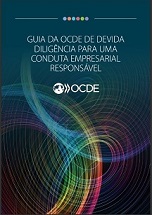
This Guidance also seeks to promote a common understanding among governments and stakeholders on due diligence for responsible business conduct. The UN Guiding Principles on Business and Human Rights as well as the ILO Tripartite Declaration of Principles Concerning Multinational Enterprises and Social Policy also contain due diligence recommendations, and this Guidance can help enterprises implement them.
The recommendations set out in this Guide were adopted at the Ministerial Meeting of the OECD Council on 31 May 2018.
Consult the OECD Multistakeholder Guide on Due Diligence for Responsible Business Conduct.
Promoting Responsible Business Conduct (RBC) in the financial sector is vital to building a sustainable global economy. However certain characteristics of the sector, including diverse and extensive business relationships, a complex landscape of regulatory obligations, and the nature of various transactions, can make the practical application of effective due diligence systems challenging.
The OECD Centre for RBC has worked to operationalize RBC due diligence for different financial transactions and actors through developing fit-for-purpose guidance.
More up-to-date information can be found on the OECD's website on Responsible Business Conduct in the Financial Sector.
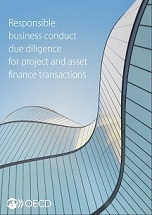
Responsible Business Conduct Due Diligence for Project and Asset finance transactions
This document is intended for financial institutions wishing to implement the recommendations of the OECD Guidelines for Multinational Enterprises with regard to due diligence in the context of project finance and asset acquisition transactions. Provides practical advice to financial institutions on key aspects of the due diligence process, including stakeholder engagement, managing customer confidentiality, providing or contributing to the redress process, and more.
Companies can contribute to positive social and economic development when they involve stakeholders, such as local communities, in their planning and decision-making. This is particularly true in the extractive sector, which is associated with extensive social, economic and environmental impacts.
The OECD has prepared a Due Diligence Guide for Meaningful Stakeholder Engagement in the Extractive Sector to provide practical guidance for companies in this sector to meet the challenge of constructively engaging stakeholders.
More up-to-date information can be found on the OECD Page on Responsible Business Conduct in Stakeholder Engagement in the Extractive Sector.
This Guide promotes the alignment of the operations of companies in the garment and footwear sector with government policies, with a view to increasing trust between them and the societies in which they operate. It also contributes to the adoption by companies of the due diligence recommendations contained in the United Nations Guiding Principles on Business and Human Rights, as well as in the Tripartite Declaration of the International Labor Organization.
This Guide supports companies to operate and source responsibly in the garment and footwear sector.
The preparation of this Guide was based on the detailed reports sent by the NCPs of France and Italy on the application of the OECD Guidelines in the textile and clothing sector. It also seeks to respond to statements made in 2013 and 2014 by various NCPs, following the April 24, 2013 collapse of the Rana Plaza factory.
More up-to-date information can be found on the OECD website on Responsible Supply Chains in the Apparel and Footwear Sector.
The OECD and FAO have developed this Guide to help companies comply with standards on responsible business conduct and conduct due diligence in agricultural supply chains to ensure that their operations contribute to sustainable development. The Guide includes:
- A corporate policy template that outlines the standards that must be observed by companies in building responsible supply chains in the agricultural sector;
- A procedure for conducting due diligence based on risk assessment, which describes the five steps that must be adopted by companies to identify, prevent, mitigate and report how they deal with the adverse impacts of their activities;
- A description of the risks with the greatest impact on companies in this sector, as well as measures to mitigate these risks;
- A guide to promote the involvement of indigenous peoples.
More up-to-date information can be found on the OECD Page on OECD-FAO Guidance for Responsible Supply Chains in the Agricultural Sector.
OECD-FAO Business Handbook on Deforestation and Due Diligence in Agricultural Supply Chains
The OECD-FAO Business Handbook on Deforestation and Due Diligence in Agricultural Supply Chains aims to help companies incorporate deforestation and forest degradation considerations in their supply chain due diligence and responsible sourcing efforts and adopt a holistic approach to deforestation risk and forest-positive outcomes.
It builds on the risk-based due diligence framework of the OECD-FAO Guidance for Responsible Agricultural Supply Chains, the leading international framework on responsible business conduct and risk-based due diligence in the agri-food sector. The construction of this handbook was a process of over 3 years, which included consultations with governments (USA, Germany, Japan, Brazil, Indonesia, Malaysia, among others), companies (upstream and downstream in supply chains) and NGOs.
OECD-FAO Business Handbook on Deforestation and Due Diligence in Agricultural Supply Chains – Brochure
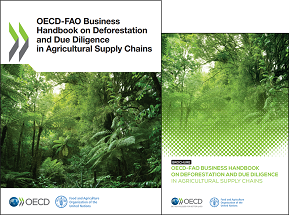
The OECD Due Diligence Guidance provides detailed recommendations to help companies respect human rights and avoid contributing to conflict through their mineral purchasing decisions and practices. This Guidance is for use by any company potentially sourcing minerals or metals from conflict-affected and high-risk areas. The OECD Guidance is global in scope and applies to all mineral supply chains.
This edition, published in April 2016, also includes recommendations for establishing responsible supply chains for tin, tantalum, tungsten and gold.
More up-to-date information can be found on the OECD Page on OECD Guidance on Due Diligence for Responsible Supply Chains of Minerals from Conflict and High Risk Areas.
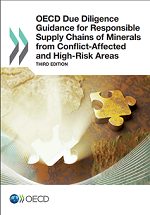
International law and policy on child labour is premised upon the belief that each child has inherent dignity and worth as a human being. A global priority is to eliminate without delay the worst forms of child labour as defined by Article 3 of ILO Convention N.º 182.
Although the OECD Guide on Due Diligence for Responsible Supply Chains of Minerals from Conflict and High Risk Areas recommends the implementation of procedures for carrying out due diligence in supply chains, based on risk assessments with a focus on compliance with Human Rights, it appears that it does not detail how companies can carry out this due diligence, centered on child labor.
This guide classifies the worst forms of child labor as a serious abuse of Human Rights, associated with the extraction, transport and/or trade of minerals whose companies must not tolerate, profit from, contribute to, help or facilitate in the course of their activity.
More up-to-date information can be found on the OECD Page on Risks of child labor in the minerals supply chain.





